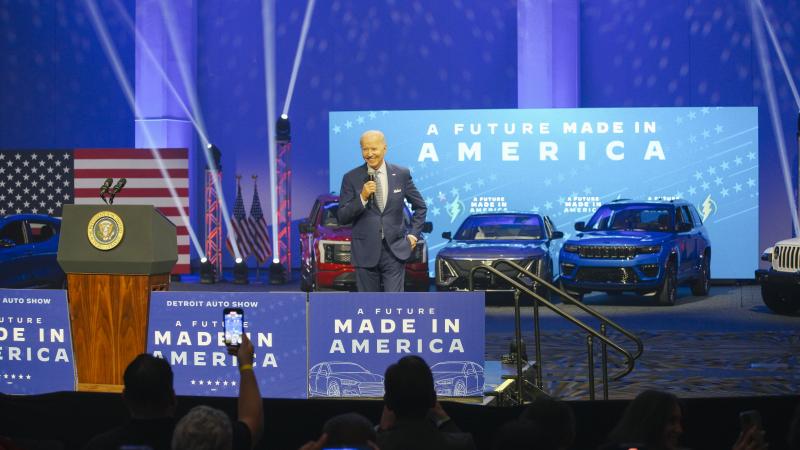NYC garage collapse the latest reality check for EVs?
A recent report has sparked fears that the added weight of electric vehicles could pose significant risks to current infrastructure, including parking garages and roads.
On Tuesday, a lower Manhattan parking garage caved in on itself, leaving one dead and five injured. While an investigation is still under way, reports suggest that several key factors could have played a role in the building's collapse, including a documented history of structural issues and the age of the building.
Engineering documents obtained by the New York Post revealed that the garage, Enterprise Ann Parking, previously had 11-foot cracks in the walls and roof, as well as a crack where the ground floor building's columns attached to a support beam on the ceiling. To make matters worse, the documents do not make clear whether such issues were fully repaired.
The building reportedly amassed 64 violations with the Department of Buildings over the last 47 years, and though structural issues appear to be the primary cause, a recent report raises concerns about how electric vehicles might pose a problem for older garage buildings.
Parking and engineering experts in the U.K. recently issued a report highlighting fears that as EVs become more common, garages built for traditional cars could exceed weight limits and be susceptible to buckling, according to The Telegraph.
"I don't want to be too alarmist, but there definitely is the potential for some of the early car parks in poor condition to collapse," said Chris Whapples, a structural engineer and consultant in the U.K. working on new parking garage regulations.
Whapples urged operators to "be aware of electric vehicle weights" and make sure that their car parks are "assessed from a strength point of view."
The Telegraph notes that EV batteries typically weigh 500 kilograms, or about 1,100 pounds. This puts EVs on a heavier spectrum than gas-powered vehicles, especially those of decades past. For example:
- The Rivian EV truck is 1,000 lbs heavier than the heaviest Ford F-150.
- A standard Tesla Model 3 weighs 3,686 lbs, whereas the Ford Cortina Mark 1 (produced from 1962-66) is 1,693lbs.
- The Audi E-tron weighs 5,183 lbs, compared to the 1,697-lb Vauxhall Viva (1963-79).
- A new Hummer EV's battery reportedly accounts for approximately one-third of the weight of the 9,000-lb vehicle.
The heaviness of electric cars, coupled with the fact that many parking garages, like the recently-collapsed New York garage, were built when cars were much lighter, could render countless parking garages around the world obsolete amid the current EV revolution.
Roads are another obstacle confronting a rapid transition to EVs. According to Reuters, car hauling companies have petitioned the government to raise the weight limit on U.S. roads, claiming that electric vehicles often exceed the weight limit the haulers must abide by.
On average, cars and trucks in general have added 1,000 lbs in weight over the last four decades, according to the popular car website The Drive.
Weight limits are not the only reality check when it comes to electric cars. The primary rationale cited for transition to EVs — to avert so-called climate change — appears to ignore potential negative environmental impacts, from the materials/minerals used in EVs to the way that they're charged.
For example, electric cars overwhelmingly run on lithium-ion batteries. Without this key mineral, the EV market would effectively be dead — but according to Fee.org, only about 5% of lithium-ion batteries are recyclable, compared to around 90% of gas-powered car batteries (ICE lead-acid).
Cobalt, another key EV battery input, can also produce substantially negative impacts on the environment. Earth.org confesses that mining for cobalt and other "green" minerals "often produces pollution that leaches into neighboring rivers and water sources." On top of this, "[d]ust from pulverised rock is known to cause breathing problems for local communities," according to the organization. Beyond the environmental hazards, cobalt miners are severely underpaid, often making just $10 per day.
Even the way the cars are charged appears to be counterproductive in terms of the green agenda. Electric cars can only work if they feed off the power grids for charging. The power grid's energy is supplied via power plants, which predominantly run on fossil fuels worldwide. This is especially true in the U.S., where the majority of the grid is powered by coal, oil and natural gas. This means that even when a Tesla is being charged, it will usually have fossil fuel to thank.
On top of the reliance on fossil fuels to power the grid that charges EVs, many state grids already cannot sustain the volume of electric cars, but push for them anyways. California, for example, is infamous for rolling blackouts and asking residents to refrain from charging their EVs so as to not overwhelm the state's energy grid. Speaking with Just The News, America First Policy Institute's Carla Sands pointed out that "the grid doesn't support" EVs.
"We don't even have enough critical minerals," she said. "Things that go in the batteries and an electric car and your cell phone — we don't have enough."
Former Colorado state Senator Ted Harvey express similar remarks to Just The News.
"Right now, the grid is not capable of [managing a high volume of EV's]," he told John Solomon. "it's going to take decades and decades, not just 10 years."
"There's no way we can put in the infrastructure to be able to meet… the electrical needs, because electricity doesn't just come out of thin air."
Follow Addison on Twitter.














